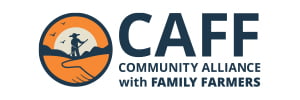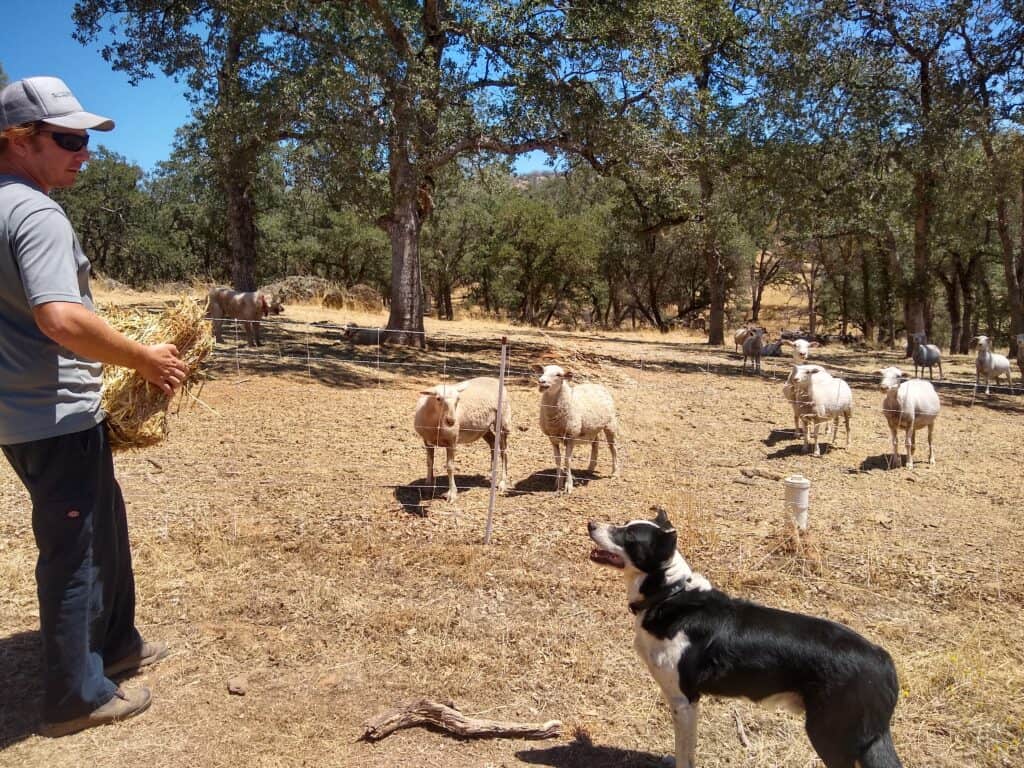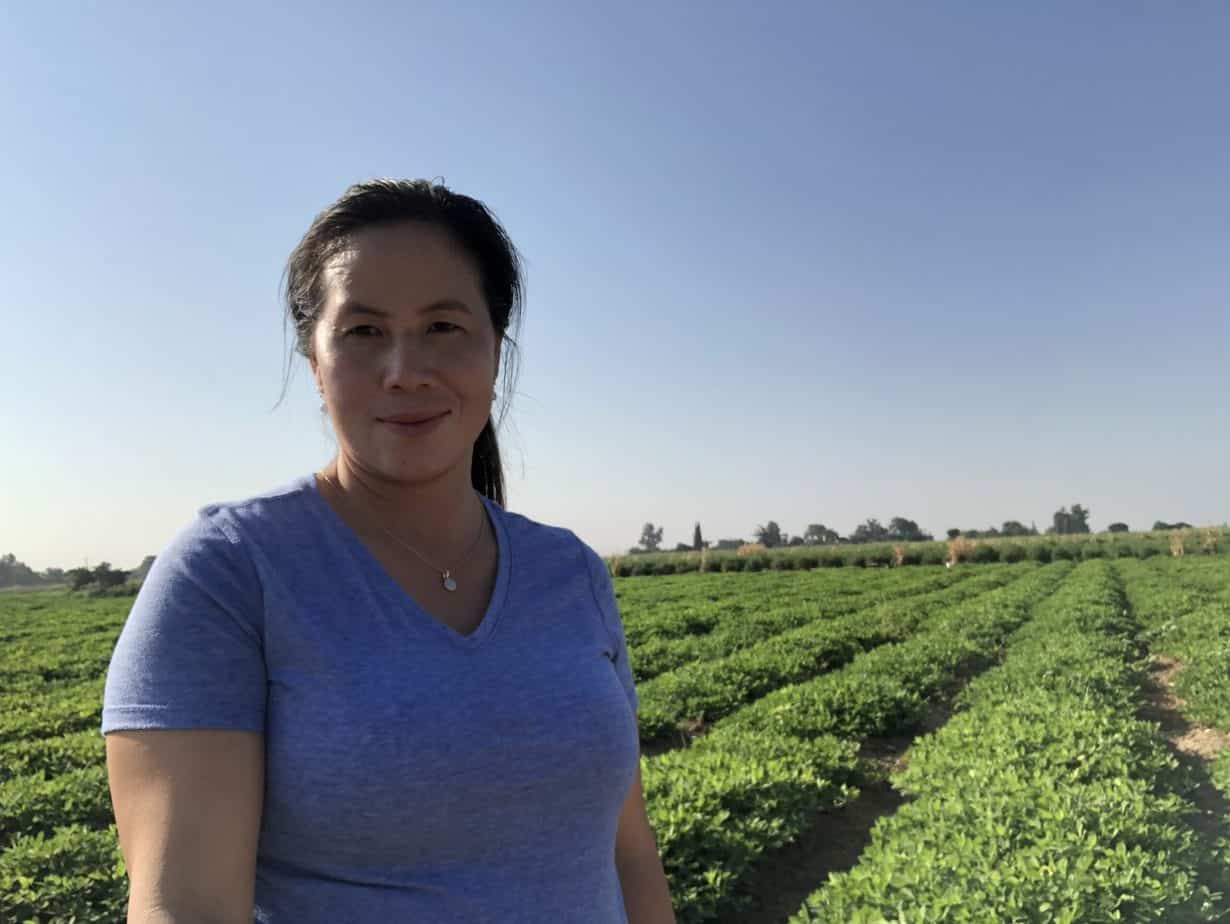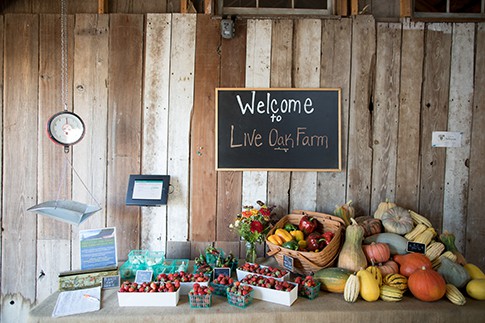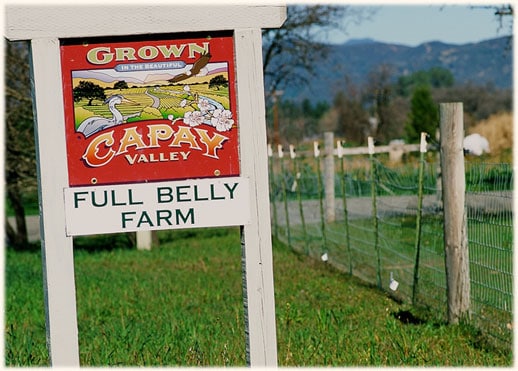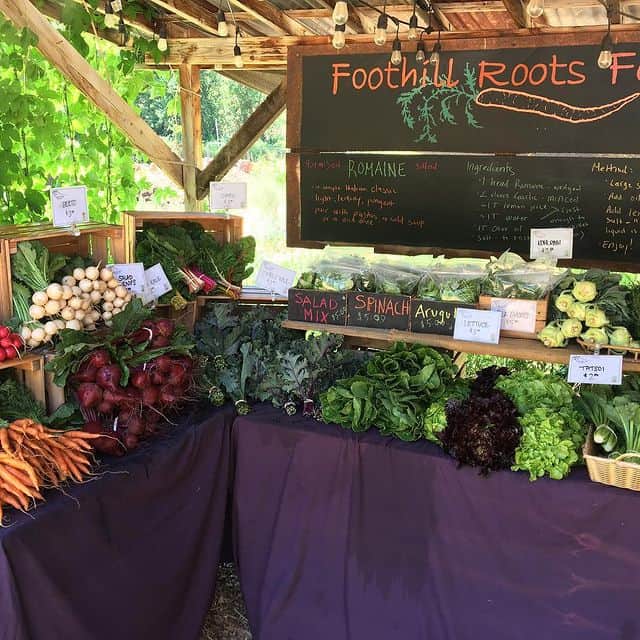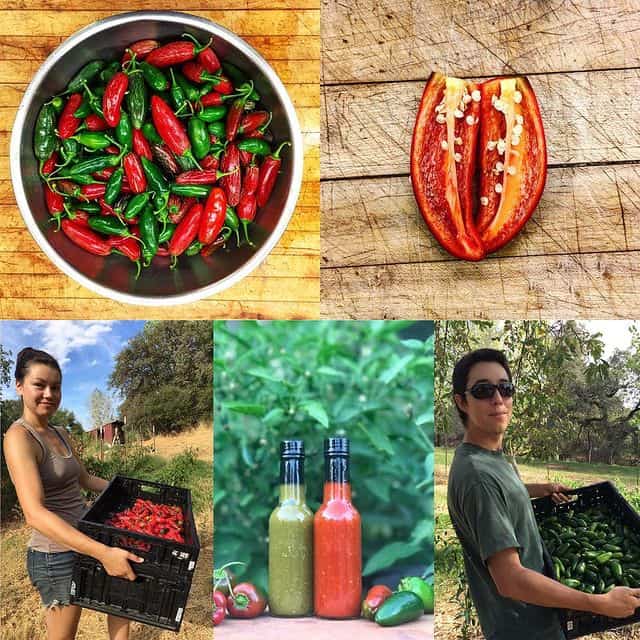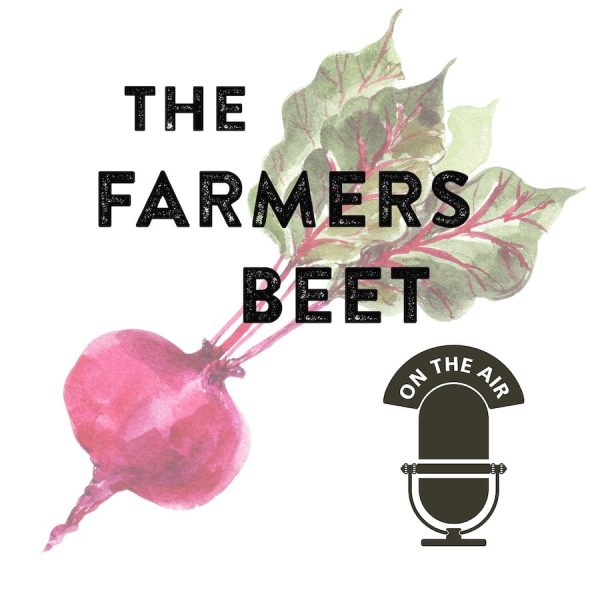
A PODCAST FOR CALIFORNIA FARMERS
In these podcast episodes we hear directly from small family farmers throughout California, getting the real information and the stories behind the food we grow and eat. In Season 1 and 2, we pay particular attention to the innovative work small-scale farmers are doing to keep their food safe to eat and share techniques – farmer to farmer. In Season 3, we travel across the state to hear directly from farmers about how they are preparing their operations against wildfire, and sharing methods for recovery. Season 4 showcases practices around nutrient cycling and soil fertility management.
Listen and Subscribe on Spotify & Apple Podcasts!
SEASON 4
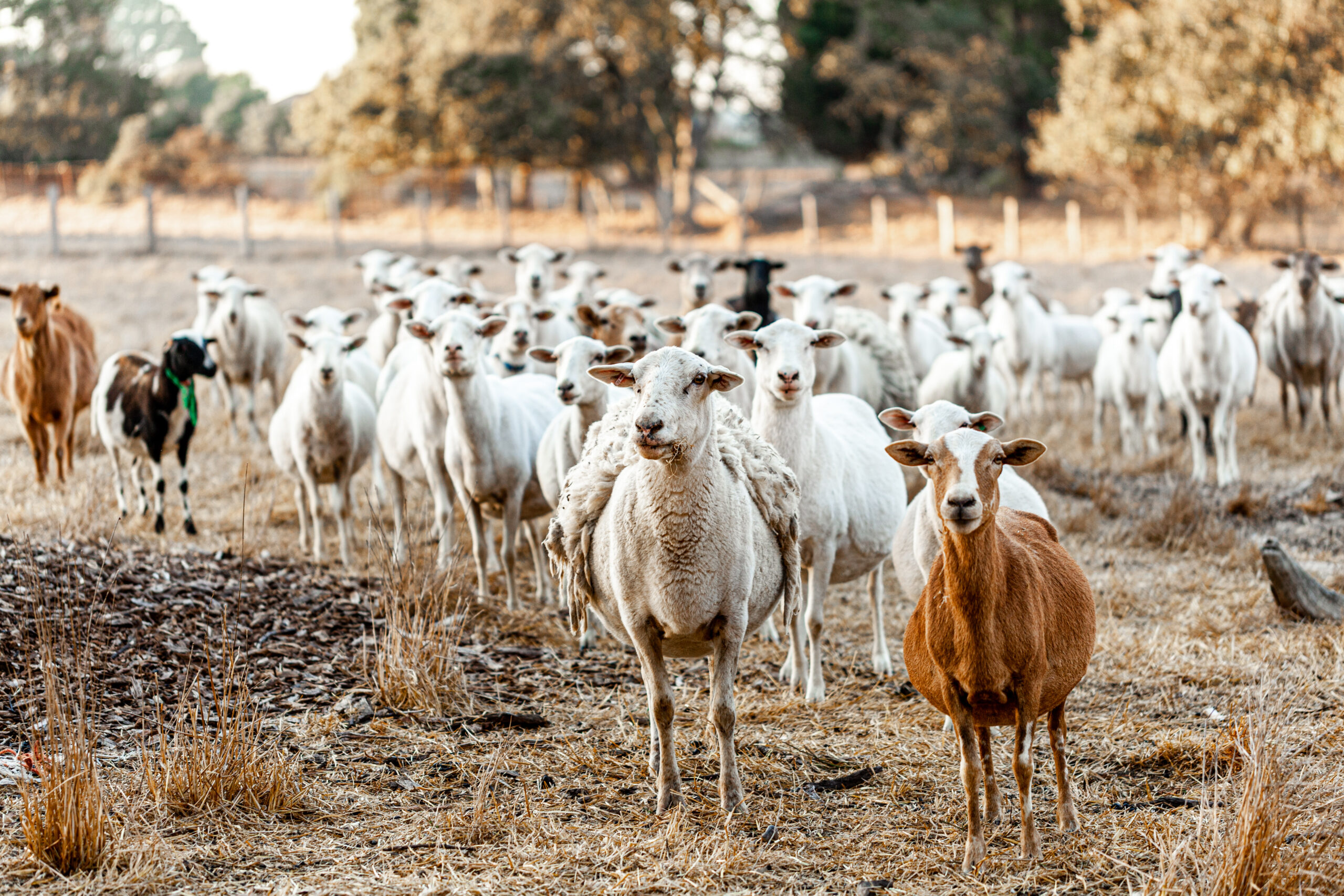
In this episode, we learn about integrated crop livestock management from two Northern California Farms. First, we hear from Lorraine Walker of Eatwell Farm in Dixon, CA, where they incorporate laying hens into their diversified vegetable production, and also touch on soil health and fertility management. Ken Walker of Pasture 42 in Guinda, CA then walks us through how they incorporate sheep and poultry into their orchards, which were designed with animal integration in mind. Both expand on the benefits and challenges of integrating livestock, as well as considerations for pasture, rotational grazing, and food safety.
Show Notes:
- Eatwell Farms website: https://www.eatwell.com/
- Eatwell Farms Instagram: https://www.instagram.com/eatwellfarm/
- Pasture 42 website: https://pasture42.com/
- Pasture 42 Instagram: https://www.instagram.com/pasture_42/
- Match.Graze California Grazing Exchange https://matchgraze.com/
- California Wool Growers’ Association Targeted Grazing Directory: https://californiawoolgrowers.org/targeted-grazing/directory/
- More about Integrated Crop Livestock Systems from CAFF: http://caff.org/ecologicalfarming/integrated-crop-livestock-systems/
- CAFF’s Ecological Farming Program: http://caff.org/ecologicalfarming
Production Team:
- Podcast hosted by Emily Ayala
- Audio engineering and editing by Coby McDonald
- Music by Blue Dot Sessions
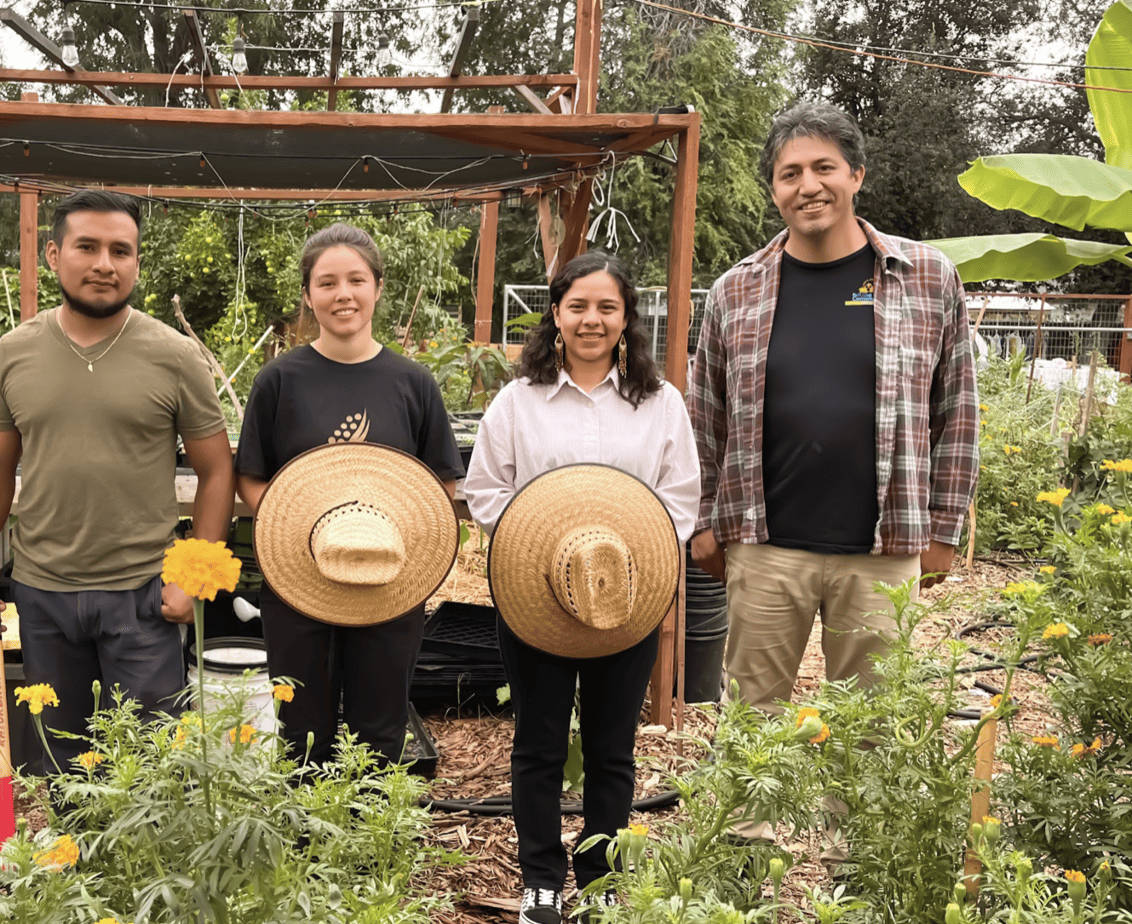
Photo: Abel Ruiz
In this episode we delve into all things on-farm composting, from its production to its use and relevant agricultural policies. We hear from Abel Ruiz at CRECE Farming Collective in Santa Ana about various composting methods at a small scale. Then, Liz Schroeder of Spreadwing Farm in Rumsey shares about their use of compost on an organic farm, from considerations around sourcing compost to its application. Dave Runsten, CAFF’s Water Policy Director, also provides an update on the state of composting policy in California.
Show Notes:
- CRECE Urban Farm Collective: https://www.crece-coop.org/about
- CRECE Urban Farm Collective on Instagram: https://www.instagram.com/crece.coop
- Spreadwing Farm: https://spreadwingfarm.com/
- Spreadwing Farm on Instagram: https://www.instagram.com/spreadwing_farm
- Tierra Negra (es) : https://tierranegramx.wixsite.com/website
- Assessing Compost Quality for Agriculture: https://anrcatalog.ucanr.edu/pdf/8514.pdf
- Organic Materials Management from CalRecycle: https://calrecycle.ca.gov/organics/farming/
- More on CAFF’s policy work: https://caff.org/policy/
- On-Farm Composting video with Frog Hollow Farm: https://www.youtube.com/watch?v=zSUSUH04Bjw
- CAFF’s Ecological Farming Program: http://caff.org/ecologicalfarming
Production Team:
- Podcast hosted by Emily Ayala
- Audio engineering and editing by Coby McDonald
- Music by Blue Dot Sessions
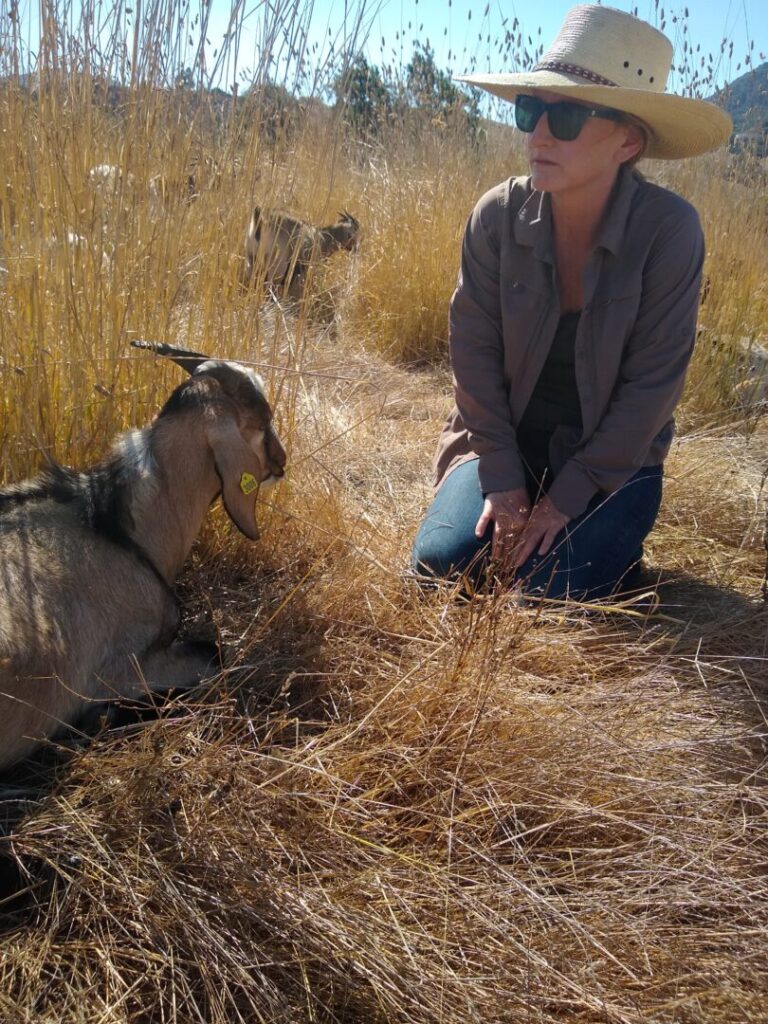
In this episode we connect with Beth Reynolds of The Goat Girls, a women owned and operated contract grazing operation located on California’s Central Coast to learn about her successes and challenges with long term viability of the targeted grazing industry, especially as it relates to fire preparedness and fuels management.
Over the last decade, California has experienced the most dangerous, destructive, and environmentally hazardous wildfires in the history of the state. Prescribed grazing is a versatile and ecologically-based wildfire mitigation strategy with scientifically proven benefits to our environment, soil, and greenhouse gas reduction goals. Prescribed grazing complements other vegetation management practices through the reduction of fuel loads and implementation in areas where controlled burns are considered too risky or not appropriate for the ecosystem.
Later in the episode, we join Senator Monique Limón on a tour of a grazing operation in Ojai Valley, who represents District 19 in Santa Barbara County. She authored Senate Bill 675 and introduced it in February of this year in order to enhance wildfire mitigation efforts by expanding statewide prescribed grazing efforts.
Show Notes:
- The Goat Girls
- Cal Poly Sheep Unit
- SB 675
- AB 297
- Paso Robles- Salinas River Vegetation Management Project
- CEQA and grazing resources
- Prescribed Herbivory White paper from the Rangeland Management Advisory Committee
- Regional Water Quality Control Board and Grazing tips
- Upper Salinas- Las Tablas Resources Conservation District
- CAFF’s Wildfire Resilience Program
- California Climate and Action Network: Wildfire Policy Resources
- Resources Legacy Fund- Wildfire Strategies
Production Team:
- Podcast hosted by Amber Schat and supported by Grizzly Corps Fellow, Joshua Harjes
- Audio engineering and editing by Coby McDonald
- Music by Blue Dot Sessions
SEASON 3
In this episode we visit Cheetah Tchudi at his diversified operation in Yankee Hill, Butte County, CA. Cheetah shares his experience surviving the 2018 Paradise wildfire, and some methods for recovery; addressing toxic ash using fungi to capture and and treat persistent organic pollutants and heavy metals.
Show Notes:
- Turkey Tail Farm Website: https://turkeytailfarm.net/v2/
- Butte Remediation: https://butteremediation.com/
- Mycoremediation: https://en.wikipedia.org/wiki/Mycoremediation
- NRCS Disaster Assistance: https://www.nrcs.usda.gov/conservation-basics/conservation-by-state/california/post-fire-disaster-assistance
- Ag Pass Programs: https://escholarship.org/uc/item/1g94z1qn
- OSU and OSHA Programs for Stay and Defend: https://ourimpact.oregonstate.edu/story/farmers-get-handle-wildfire-prevention-osu-extension-outreach
- Cal OES Wildfire Recovery: https://wildfirerecovery.caloes.ca.gov/
- CAFF’s Wildfire Resilience Program: http://caff.org/wildfire-resilience-program/
Production Team:
- Podcast hosted by Amber Schat- Wildfire Resilience Specialist at CAFF
- Audio engineering and editing by Coby McDonald
- Music by Blue Dot Sessions
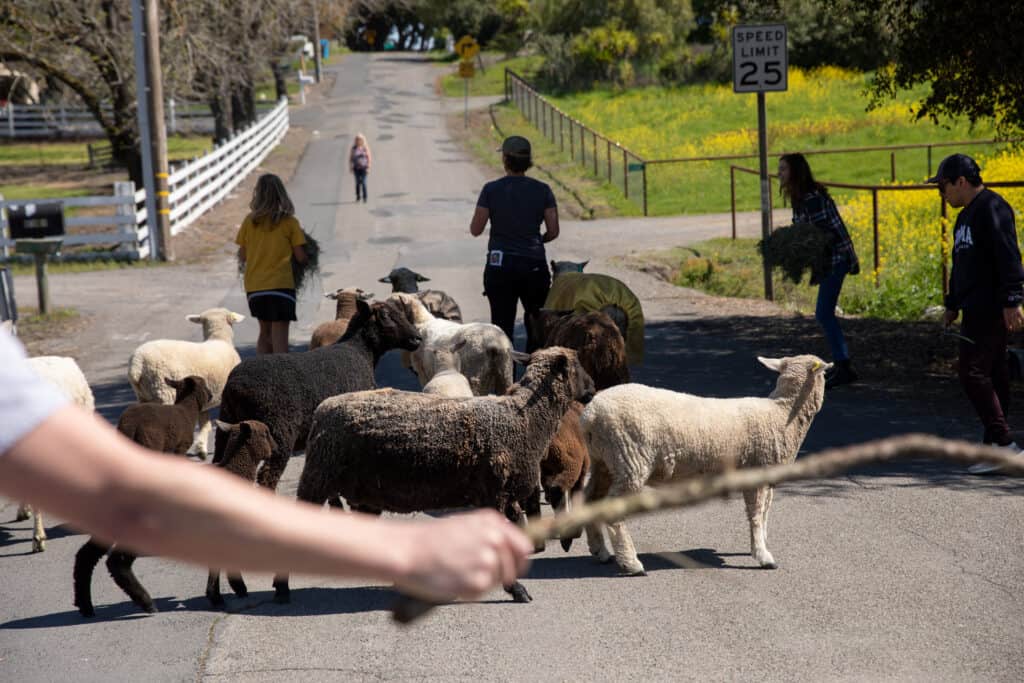
In this episode, Sarah Keiser of Wild Oat Hollow describes her entry into ranching and how her love of the land positioned her to become a leader in developing and supporting community grazing cooperatives. Join us as Sarah shares her experience with wildfires in Sonoma County and how grazing is making a difference for regional wildfire protection and preparedness, while also working to reconnect locals with the ecology of the region and each other.
Show Notes:
- Wild Oat Hollow Website: https://www.wildoathollow.com/
- Fibershed: https://fibershed.org/
- Globetrotter Foundation: https://globetrotterfoundation.org/
- Indigenous Fire Ecologist, Peter Nelson: https://ourenvironment.berkeley.edu/users/754001
- Soil Health and Grazing: https://www.ndsu.edu/agriculture/ag-hub/ag-topics/natural-resources-and-facilities/grazing-management/soil-health-relation-grazing
- Grazing and Wildfire Risk Reduction: https://www.sciencedirect.com/science/article/pii/S0190052822000177
- CAFF’s Wildfire Resilience Program: http://caff.org/wildfire-resilience-program/
Production Team:
- Podcast hosted by Amber Schat
- Audio engineering and editing by Coby McDonald
- Music by Blue Dot Sessions
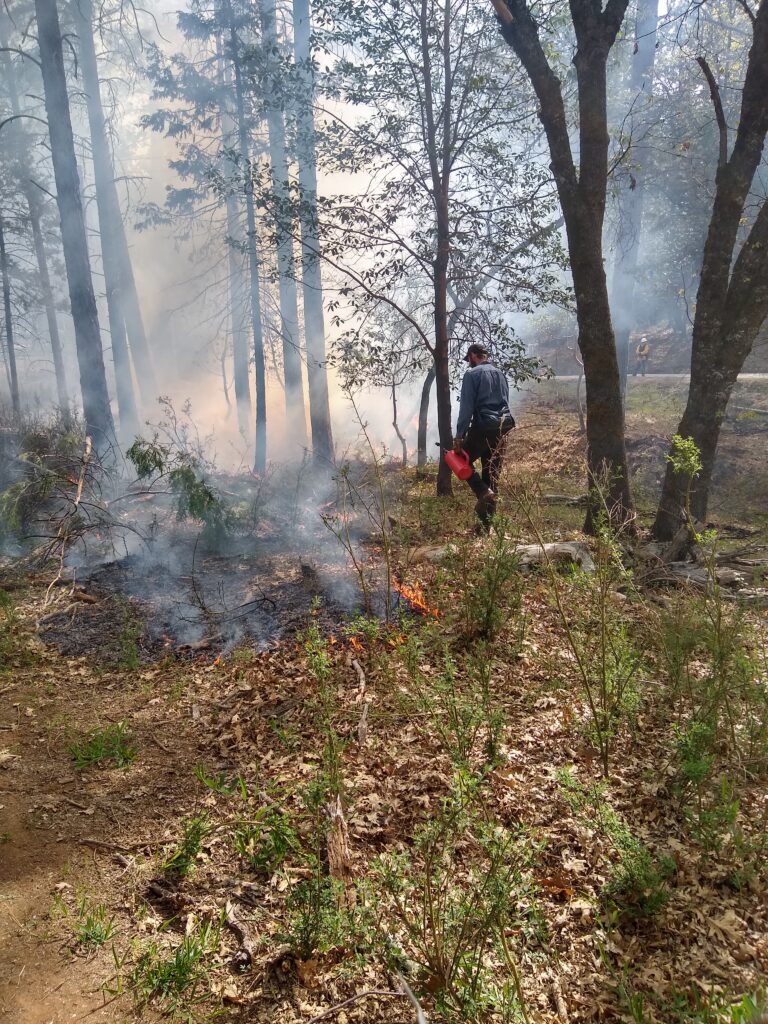
In this episode, we travel to First Rain Farm in Nevada County, where Tim Van Wagner is integrating a number of effective wildfire preparation methods on his property, as well as those of his neighbors and surrounding community. By combining targeted ecological grazing and prescribed burns, Tim is able to rehabilitate overgrown forests in the foothills to productive foraging systems that support greater biodiversity, sequester more carbon, and improve soil health and water quality in the region- all while also reducing the threat of catastrophic wildfires.
Show Notes:
First Rain Farm Website: https://www.firstrainfarm.com/
California Prescribed Burn Association: https://calpba.org/
UC ANR Fire Resources and Information: https://ucanr.edu/sites/fire/
Brittleness Scale: https://savoryinstitute.teachable.com/courses/896826/lectures/16507356
Land Management Regimes of Nevada County: https://www.ncrcd.org/resources-and-links/knowledge-base/agriculture-resources/
Ruminant Digestive System: https://extension.umn.edu/dairy-nutrition/ruminant-digestive-system
Fuel Moisture: http://stream1.cmatc.cn/pub/comet/FireWeather/S290Unit10FuelMoisture/comet/fire/s290/unit10/print.htm#page_1.0.0
Smoke Exposure and Safety: https://www.dir.ca.gov/dosh/wildfire/worker-protection-from-wildfire-smoke.html
SB 926- Rx Burn Liability Fund: https://leginfo.legislature.ca.gov/faces/billTextClient.xhtml?bill_id=201920200SB926
CAFF’s Wildfire Resilience Program: http://caff.org/wildfire-resilience-program/
Production Team:
- Podcast hosted by Amber Schat- Wildfire Resilience Specialist at CAFF
- Audio engineering and editing by Coby McDonald
- Music by Blue Dot Sessions
- Release Date: 12/14/2022
SEASON 2
Photo from Bai Thao
In this episode we visit Bai Thao at her farm in Sanger, CA. We learn about Bai’s family history in agriculture and her farming and food safety practices, including water testing and an inventive method for ensuring her tools stay sanitized.
SHOW NOTES:
- A tour of Bai Thao’s lemongrass fields: https://www.youtube.com/watch?v=Ks-RN6AxnJI
- Hmong history in California: http://www.hmongstory40.org/about-hmongstory-40/
- History of Hmong Farming in Fresno: https://www.youtube.com/watch?v=C0EEVlhvEH8
- Fresno Asian Business Institute & Resource Center (ABIRC) – a nonprofit organization, whose mission is to support and promote strong networks of Asian business owners in the Central CA region, including farmers: https://www.facebook.com/fresnoasianbusinessinstitute/
- CAFF’s Food Safety Templates (some available in Hmong): http://caff.org/food-safety/food-safety-plan-templates/
- FSMA Produce Safety Rule Water Requirements: https://producesafetyalliance.cornell.edu/resources/fsma-produce-safety-rule-water-requirements%c2%a0insights-get-you-organized/
Production Team:
- Podcast hosted by Grace Perry
- Audio engineering and editing by Jaime Roque
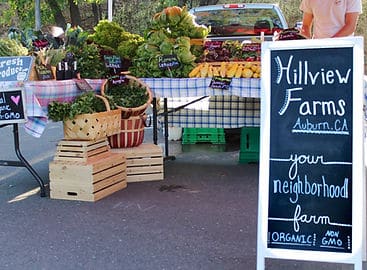
Photo from Hillview Farms
In this episode we visit Shanon and Michael Whamond at their farm in Placer County, CA. We learn about Shanon and Michael’s farming journey, recent challenges and their farm’s food safety practices, including how they maintain produce quality during hot summer days and prevent risk of cross-contamination throughout busy days.
SHOW NOTES:
- Hillview Farms website: https://www.hillviewfarmsproduce.com/home
- Hillview Farms Instagram: https://www.instagram.com/hillviewfarms/
- Sanidate 5.0 – the sanitizer product mentioned: https://biosafesystems.com/product/sanidate-5/
- CAFF’s Food Safety Templates (including SOPs): http://caff.org/food-safety/food-safety-plan-templates/
- Introduction to Selecting an EPA-labeled Sanitizer from the Produce Safety Alliance: https://producesafetyalliance.cornell.edu/sites/producesafetyalliance.cornell.edu/files/shared/documents/Sanitizer-Factsheet.pdf
- Excel Tool for Selecting a Labeled Sanitizer for Product from the Produce Safety Alliance (find it under the ‘Sanitation’ heading): https://producesafetyalliance.cornell.edu/resources/general-resource-listing/
Production Team:
- Podcast hosted by Grace Perry
- Audio engineering and editing by Jaime Roque
Release date 3/9/2022
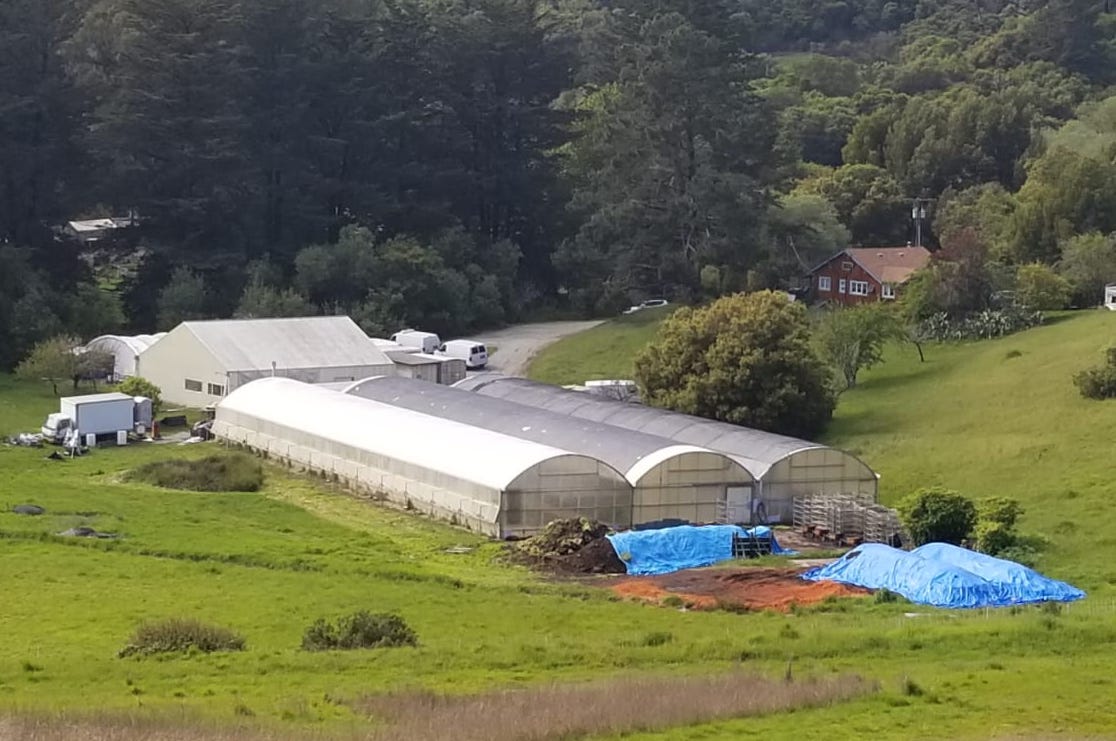
Photo from New Natives
In this episode we visit Ken Kimes at New Natives Farm in Santa Cruz County. We learn how New Natives pivoted during the beginnings of the COVID-19 pandemic, their food safety practices, including tips for passing a third party food safety audit, and walks us through the farm’s post harvest process and identifies helpful tools and equipment.
SHOW NOTES:
- New Natives website: http://www.newnatives.com/
- New Natives Instagram: https://www.instagram.com/newnativesmicrogreens/
- COVID-19 Food Safety Resources: http://caff.org/food-safety-resources/
- CAFF’s Food Safety Templates (including Food Safety Plans): http://caff.org/food-safety/food-safety-plan-templates/
- Sprouts: Subpart M of the Food Safety Modernization Act (FSMA) Factsheet: https://wayback.archive-it.org/7993/20170723110052/https://www.fda.gov/downloads/Food/GuidanceRegulation/FSMA/UCM359285.pdf
- Farmer’s Handbook for the USDA Harmonized GAP Standard from Carolina Farm Stewardship Association: https://www.carolinafarmstewards.org/usda-harmonized-gap-handbook-and-recordkeeping-templates/
- EcoLab Tsunami Antimicrobial Products: https://www.ecolab.com/offerings/process-water-antimicrobials-food-contact
Production Team:
- Podcast hosted by Grace Perry
- Audio engineering and editing by Jaime Roque
Release date 3/16/22
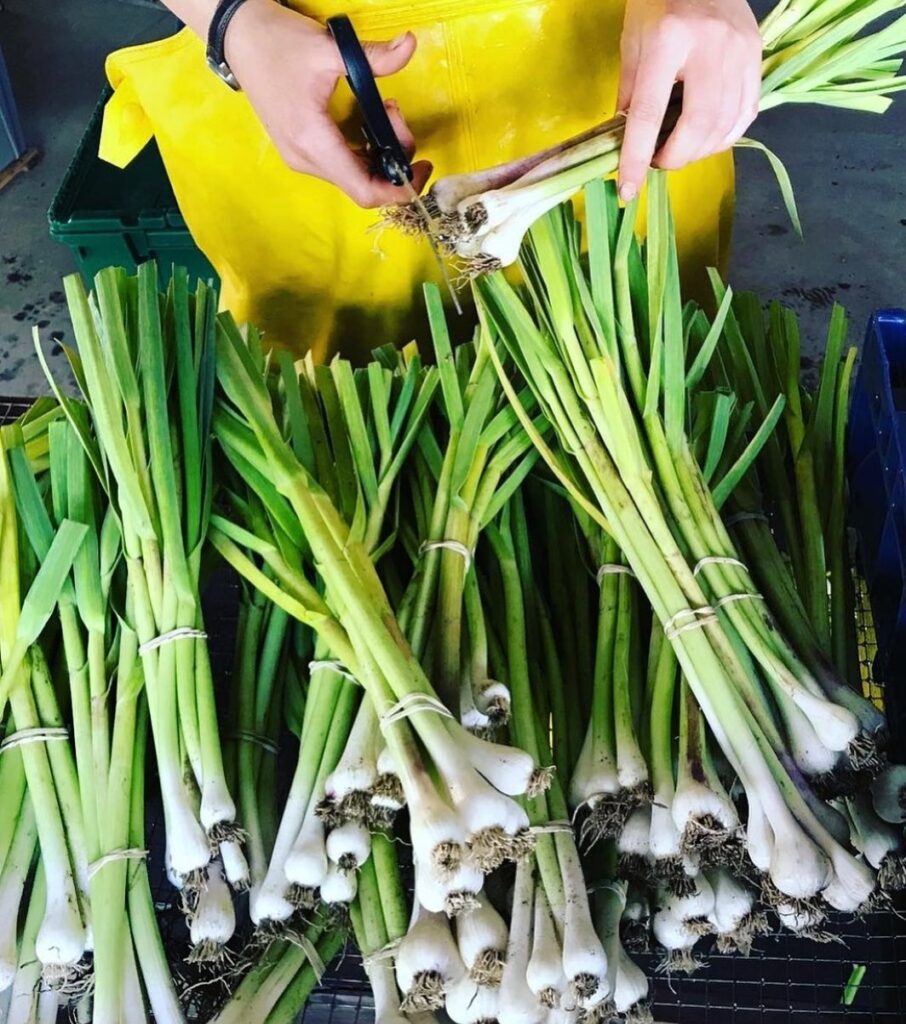
Photo from Soil Born Farms
In this episode we interview Tyler Stowers, the farm manager at Soil Born Farms in Rancho Cordova, California. We learn about the organization’s history and growth, how they integrate food safety practices into their day-to-day operations as an urban-based education farm and address the food safety saying “never let produce touch the ground”.
SHOW NOTES:
- Soil Born Farms website: https://soilborn.org/
- Soil Born Farms Instagram: https://www.instagram.com/soil_born_farms/
- COVID-19 Food Safety Resources: http://caff.org/food-safety-resources/
- CAFF’s Food Safety Templates (including mock recall and recordkeeping templates): http://caff.org/food-safety/food-safety-plan-templates/
- California Urban Agriculture Food Safety Guide: Laws and Standard Operating Procedures for Farming Safely in the City: https://escholarship.org/content/qt2wc7s0q1/qt2wc7s0q1.pdf?t=qod89d
Production Team:
- Podcast hosted by Grace Perry
- Audio engineering and editing by Jaime Roque
Release date 3/23/22
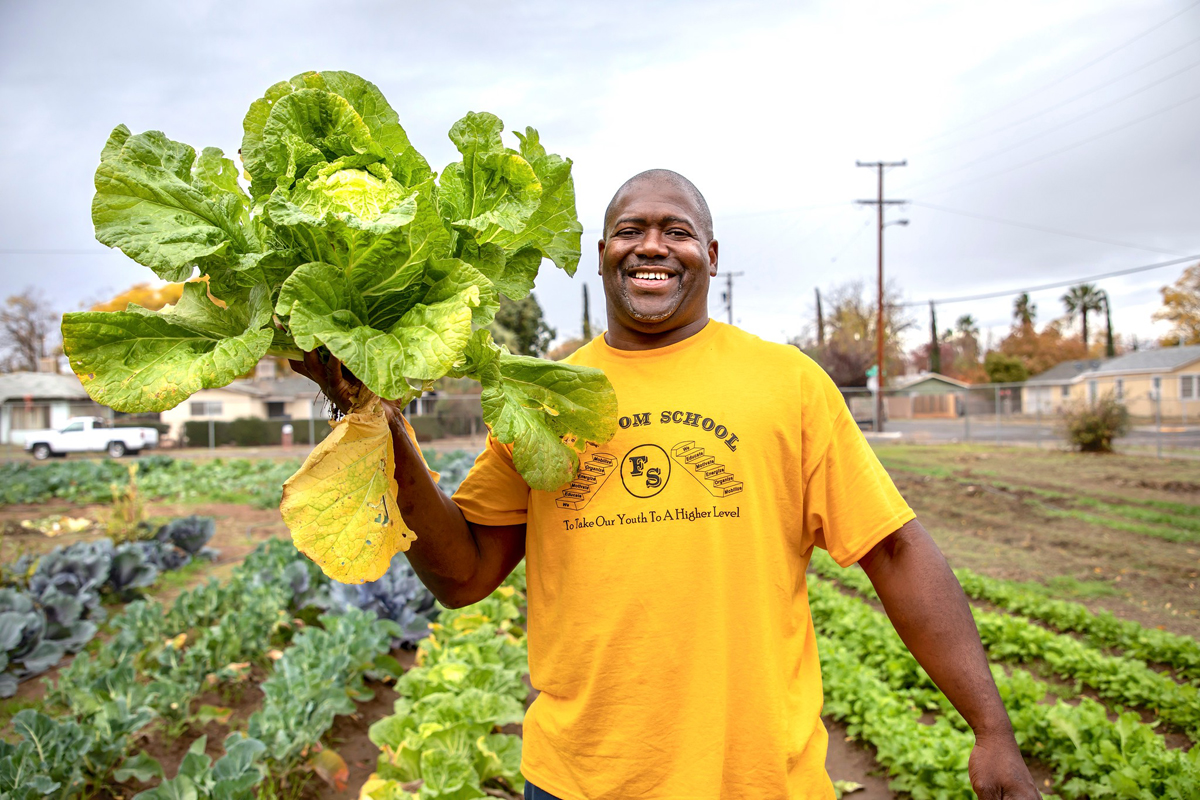
Photo from Civil Eats
In this episode we hear from Dr. Floyd D. Harris Jr. of Fresno Freedom School in Fresno, California. We learn about the organization’s history and mission to connect Fresno’s youth with agriculture, how they implement food safety practices as an urban-based education farm and tips for communicating their food and human safety guidelines to youth, parents and volunteers.
SHOW NOTES:
- Fresno Freedom School website: https://xyfloyd.wixsite.com/freedomschool
- Fresno Freedom School Facebook: https://www.facebook.com/FresnoFreedomSchool/
- Fresno Freedom School in Civil Eats: https://civileats.com/2019/02/13/fresnos-freedom-school-is-changing-the-narrative-on-farming-for-black-youth/
- CAFF’s Food Safety Templates (including food safety plan and recordkeeping templates): http://caff.org/food-safety/food-safety-plan-templates/
- California Urban Agriculture Food Safety Guide: Laws and Standard Operating Procedures for Farming Safely in the City: https://escholarship.org/content/qt2wc7s0q1/qt2wc7s0q1.pdf?t=qod89d
Production Team:
- Podcast hosted by Grace Perry
- Audio engineering and editing by Jaime Roque
Release date 3/30/22
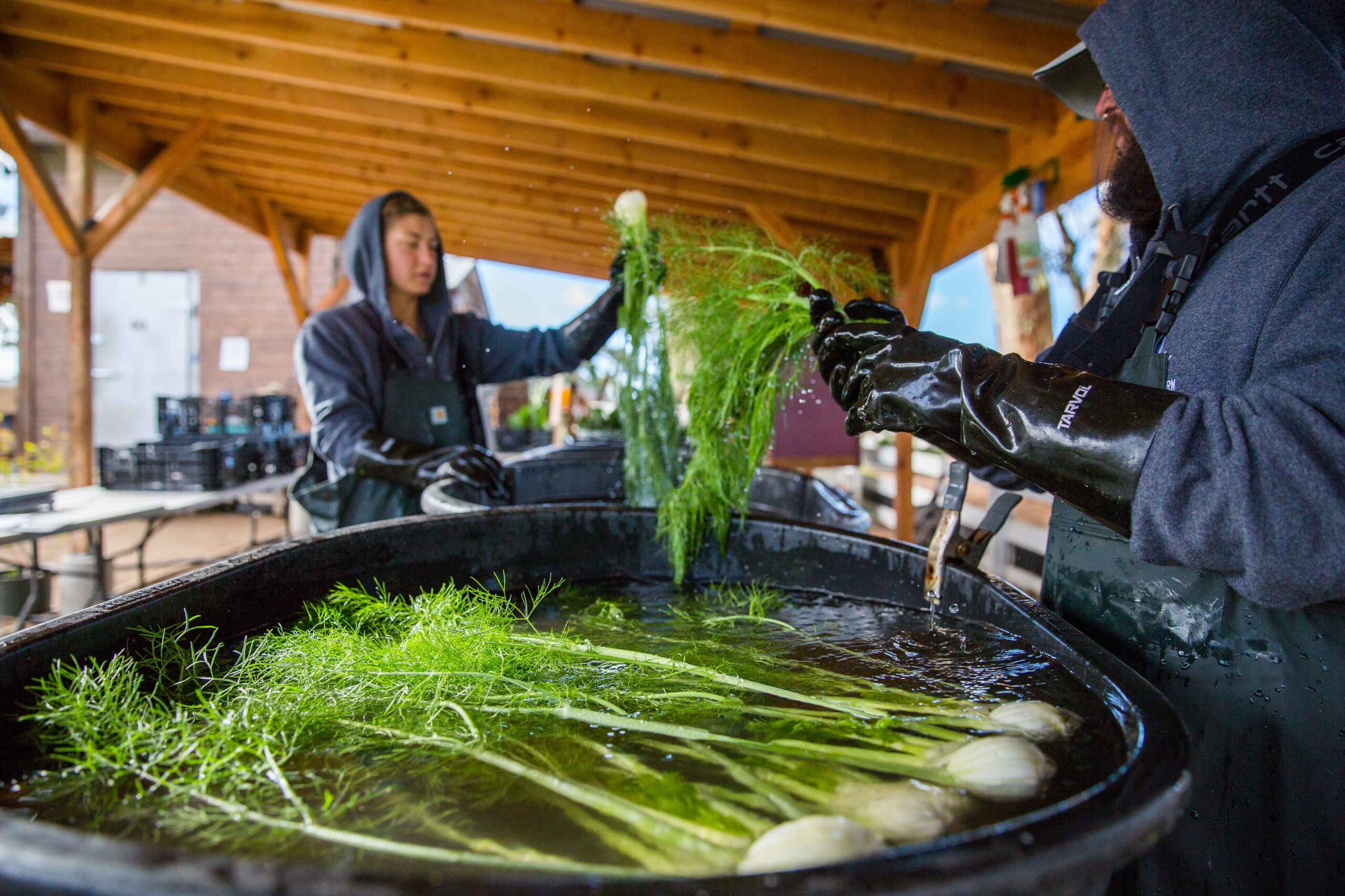
Photo from Coastal Roots Farm
In this episode we visit Coastal Roots Farm in Encinitas, California. We learn about the farm’s mission to connect agriculture, education and ancient Jewish wisdom. The farmers give us a tour of the food forest, production fields, laying hens and compost production, and describe how food safety plays a role in their day-to-day operations. Listeners can look forward to hearing tips and tricks related to food safety recordkeeping and volunteer and employee training.
SHOW NOTES:
- Coastal Roots Farm website: https://coastalrootsfarm.org/
- Coastal Roots Farm Instagram: https://www.instagram.com/coastalrootsfarm/
- Washing Machine/Greens Spinner Conversion Guide from University of Vermont: https://blog.uvm.edu/cwcallah/2022/02/24/washing-machine-greens-spinner-conversion-guide/
- CAFF’s Food Safety Templates (including SOP and recordkeeping templates): http://caff.org/food-safety/food-safety-plan-templates/
- California Urban Agriculture Food Safety Guide: Laws and Standard Operating Procedures for Farming Safely in the City: https://escholarship.org/content/qt2wc7s0q1/qt2wc7s0q1.pdf?t=qod89d
Production Team:
- Podcast hosted by Grace Perry
- Audio engineering and editing by Jaime Roque
Release Date 4/6/22
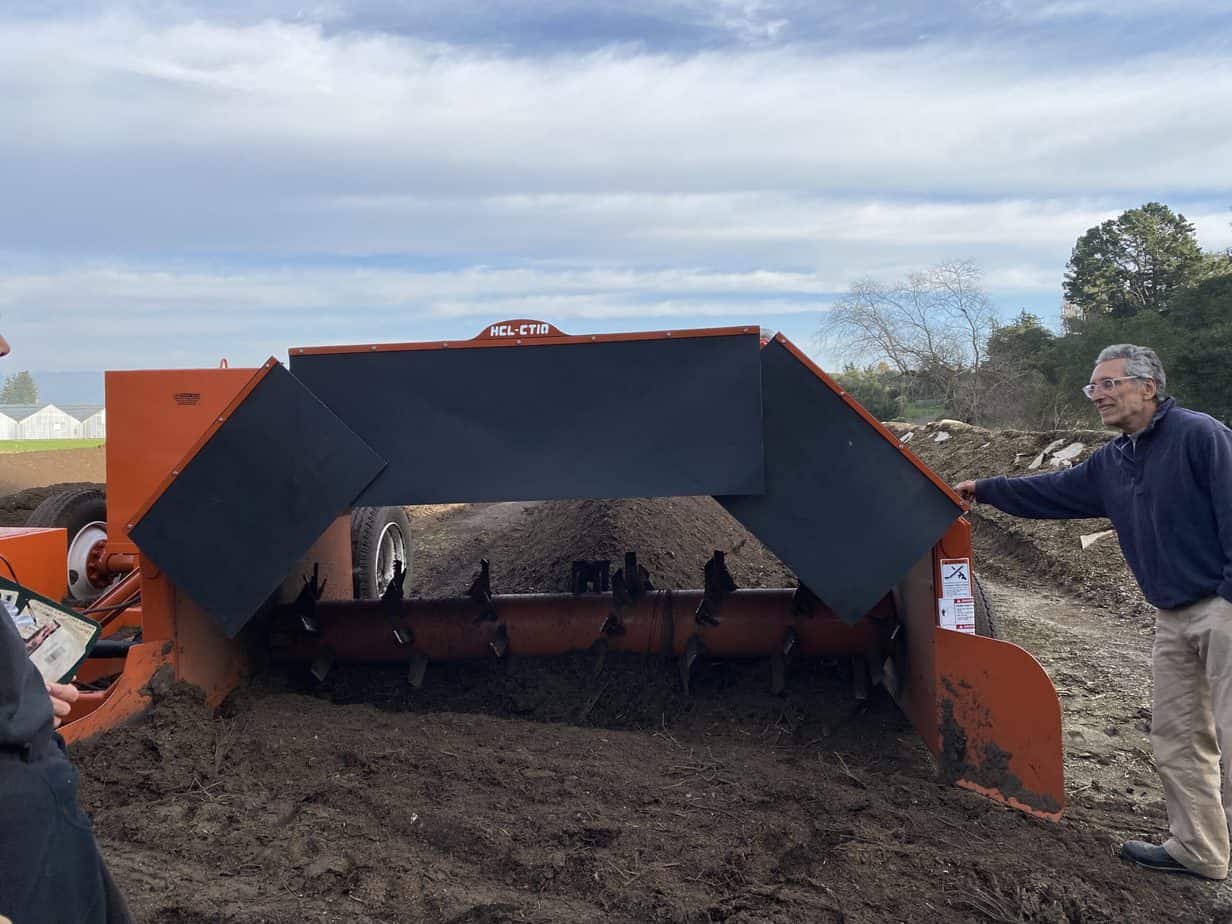
Photo from Jacobs Farm / del Cabo
In this episode we visit Jacobs Farm / del Cabo in Watsonville, California. Larry Jacobs, one of the co-founders, tells us about the company history and relationship with growers in Mexico. We learn how food safety regulations for imported produce helped identify contamination from an unlikely source, the importance of keeping wells covered and maintained, and tips for developing an engaging employee food safety training program.
SHOW NOTES:
- Jacobs Farm / del Cabo website: https://www.jacobsfarmdelcabo.com/
- Jacobs Farm / del Cabo Instagram: https://www.instagram.com/jacobsfarmdelcabo/
- CAFF’s Food Safety Templates (including a pre-harvest checklist and recordkeeping logs): http://caff.org/food-safety/food-safety-plan-templates/
- A summary of Farm Food Safety Audit Schemes from UC Small Farm Food Safety: https://ucsmallfarmfoodsafety.sf.ucdavis.edu/english/general-farm-food-safety/farm-food-safety-audit-schemes
- CAFF cost-share program for water testing: http://caff.org/food-safety-cost-share-program/
Production Team:
- Podcast hosted by Grace Perry
- Audio engineering and editing by Jaime Roque
Release Date 4/13/22
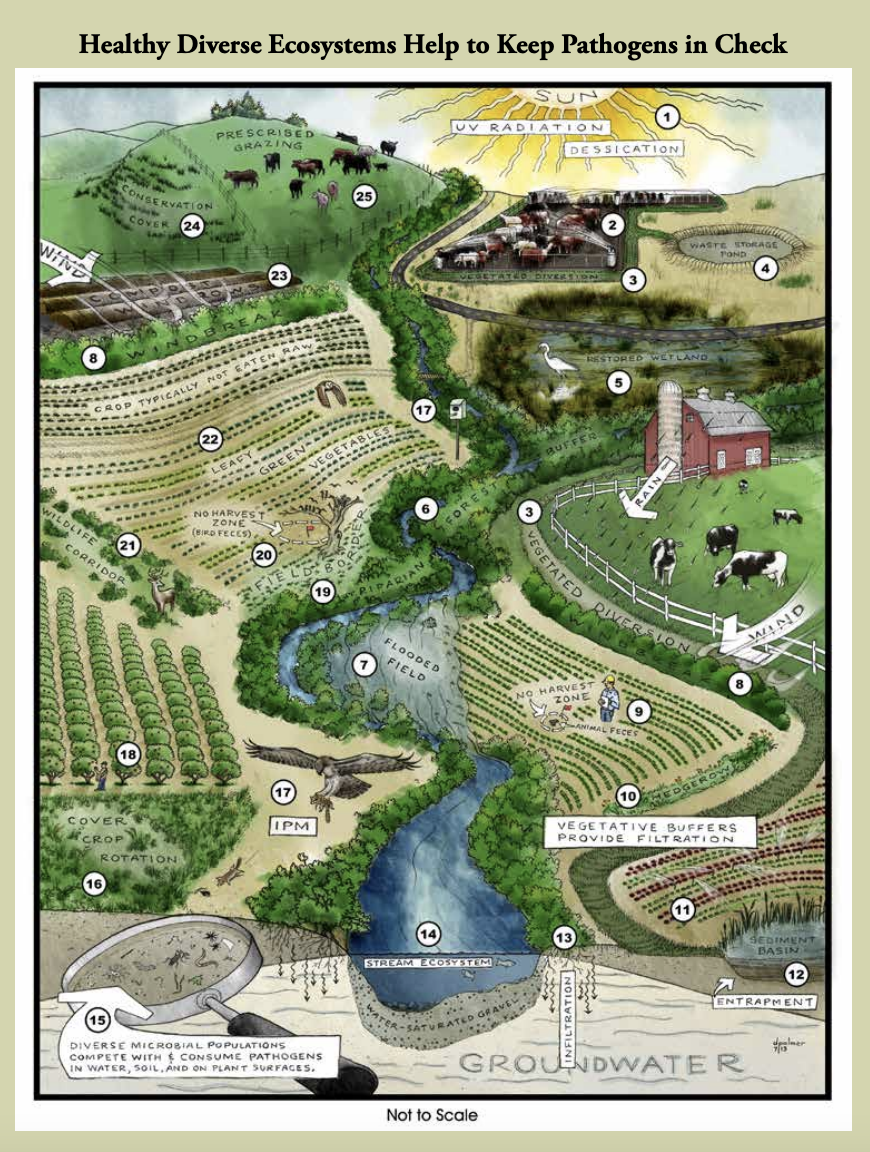
Photo from Wild Farm Alliance & CAFF
In this episode we interview Daniel Karp, Ph.D., Associate Professor at UC Davis studying conservation in working landscapes. Danny describes his research related to wildlife habitat conservation and bird activity on farms, and implications for food safety on produce farms. He also provides risk management considerations for farms with bird activity and resources for farms interested in attracting beneficial birds for their pest control services.
SHOW NOTES:
- Daniel Karp’s website with additional information and resources: https://karp.ucdavis.edu/people/daniel-karp/
- Connect with Daniel Karp on Twitter: @DSKarp
- Wild Farm Alliance: https://www.wildfarmalliance.org/
- A Farmer’s Guide to Food Safety and Conservation from Wild Farm Alliance and CAFF: https://www.wildfarmalliance.org/a_farmer_s_guide_to_food_safety_and_conservation_facts_tips_and_frequently_asked_questions
- Wildlife habitat conservation and the Food Safety Modernization Act (FSMA): https://www.wildfarmalliance.org/protecting_wildlife_habitat_through_food_safety_policy
- CAFF’s Food Safety Templates (including Pest Monitoring log): http://caff.org/food-safety/food-safety-plan-templates/
Production Team:
- Podcast hosted by Grace Perry
- Audio engineering and editing by Jaime Roque
Release Date 4/20/22
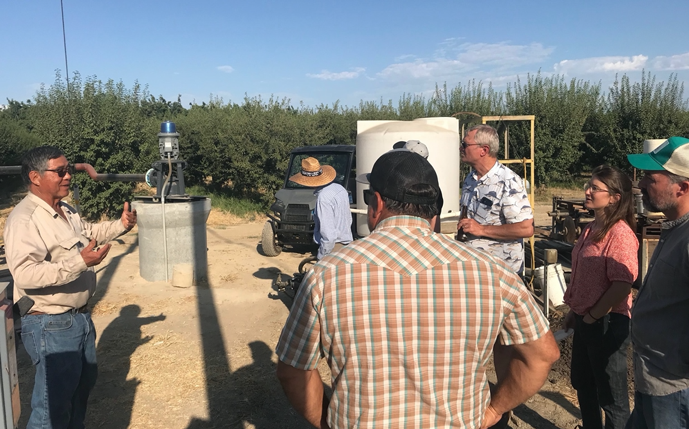
Photo from California Climate and Action Network (CalCAN)
In this episode we visit Steve Fukagawa Farms in Kingsburg, California. Steve Fukagawa is a third generation Japanese farmer, growing organically in the San Joaquin Valley. We learn about Steve’s family history farming in California, his production of organic tree fruit and raisin grapes, and use of compost tea. We also discuss how the federal Food Safety Modernization Act (FSMA) can impact the way growers use and apply soil amendments such as compost tea.
SHOW NOTES:
- ‘Nature’s Candy’: An interview with Steve Fukagawa on YouTube: https://www.youtube.com/watch?v=J5EZcz3ri1g
- A profile of Steve Fukagawa from CalCAN: https://calclimateag.org/wp-content/uploads/2020/05/Steve-Fukagawa-Farms-SWEEP-Profile.pdf
- FSMA Fact Sheet – Biological Soil Amendments of Animal Origin: https://www.fda.gov/files/food/published/Fact-Sheet–Biological-Soil-Amendments-of-Animal-Origin_Download.pdf
- Food Safety & Compost Tea Use from The University of Vermont: https://www.uvm.edu/vtvegandberry/factsheets/composttea.html#:~:text=Make%20compost%20tea%20only%20from,the%20growth%20of%20harmful%20organisms
- CAFF’s Food Safety Templates (including soil amendment application and recordkeeping logs): http://caff.org/food-safety/food-safety-plan-templates/
- CAFF cost-share program for water testing: http://caff.org/food-safety-cost-share-program/
Production Team:
- Podcast hosted by Grace Perry
- Audio engineering and editing by Jaime Roque
Release Date 5/4/22
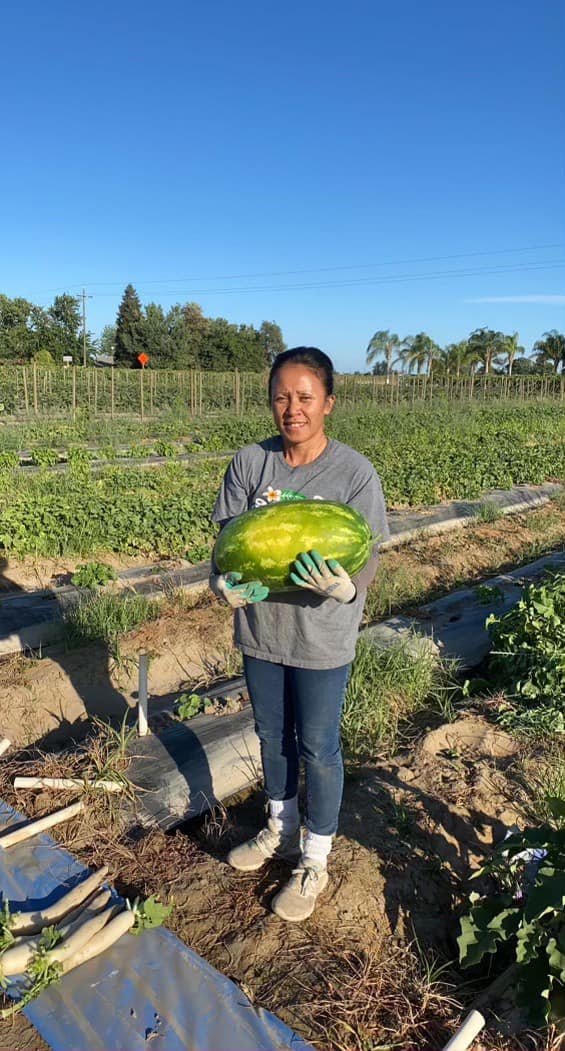
Photo from Sysourath Farms
In this episode we visit Sysourath Farms in Fresno, California. Veomany Sysourath, a second generation farmer, shares about her family’s history emigrating to the United States, working in agriculture and eventually starting their farm. Sysourath Farms grows a variety of Southeast Asian specialty crops on leased land, which presents infrastructure challenges. We learn about the farm’s food safety practices and requirements under the Food Safety Modernization Act (FSMA), plus innovative tools they use to ensure their farm complies with FSMA.
SHOW NOTES:
- This blog post can help farmers determined how they must comply with the FSMA Produce Safety Rule (PSR): http://caff.org/small-farm-fsma-series-part-1-of-4/
- This factsheet explains the record keeping requirements for farms that need to be in full compliance with FSMA: http://caff.org/fsma-recordkeeping-vs-organic-recordkeeping/
- The PSA Grower Training Course is one way to satisfy the FSMA Produce Safety Rule requirement outlined in § 112.22(c) that requires ‘At least one supervisor or responsible party for your farm must have successfully completed food safety training at least equivalent to that received under standardized curriculum recognized as adequate by the Food and Drug Administration.’ Fully covered farms must have record of one current employee attending this training. See this list of upcoming trainings: https://producesafetyalliance.cornell.edu/training/grower-training-courses/upcoming-grower-trainings/
- Fresno Asian Business Institute & Resource Center (ABIRC) – a nonprofit organization, whose mission is to support and promote strong networks of Asian business owners in the Central CA region, including farmers: https://www.facebook.com/fresnoasianbusinessinstitute/
- CAFF’s Food Safety Templates (including employee training topics and recordkeeping logs): http://caff.org/food-safety/food-safety-plan-templates/
Production Team:
- Podcast hosted by Grace Perry
- Audio engineering and editing by Jaime Roque
Release Date 5/11/22
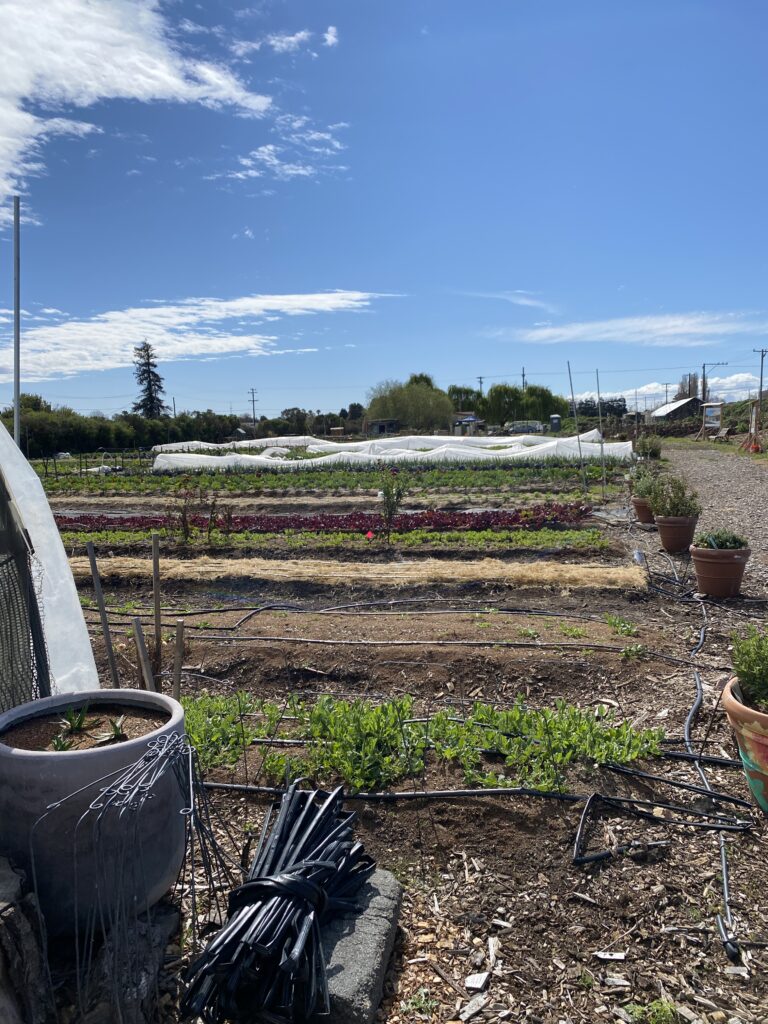
Photos from Urban Tilth
In this episode we visit Urban Tilth, a community-based organization in Richmond, California. We learn about the organization’s mission and programs to cultivate agriculture and build a more sustainable, healthy and just food system in West Contra Costa County. One of the farm managers, Debora Supinski, describes their year-long journey to formalize food safety practices through writing a food safety plan and SOPs. Listeners can look forward to hearing about the farm’s approach to volunteer management, maintaining food safety across the farm and distribution and efficiencies behind their wash and pack station.
SHOW NOTES:
- Urban Tilth website: https://urbantilth.org/
- More about the North Richmond Farm: https://urbantilth.org/grow/the-farm-today/
- Urban Tilth Instagram: https://www.instagram.com/urbantilth/
- Planning an Efficient and Safe Wash/Pack Area from University of Vermont: https://blog.uvm.edu/cwcallah/2020/02/09/planning-an-efficient-and-safe-wash-pack-area/
- Designing Your Wash Pack Station for Food Safety Webinar from Pasa Sustainable Agriculture: https://www.youtube.com/watch?v=Mgx-ojjb5S4
- CAFF’s Food Safety Templates (including SOP and recordkeeping templates): http://caff.org/food-safety/food-safety-plan-templates/
- California Urban Agriculture Food Safety Guide: Laws and Standard Operating Procedures for Farming Safely in the City: https://escholarship.org/content/qt2wc7s0q1/qt2wc7s0q1.pdf?t=qod89d
Photos from their wash and pack station:
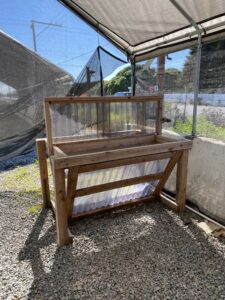
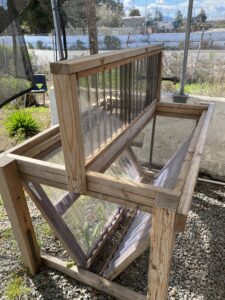
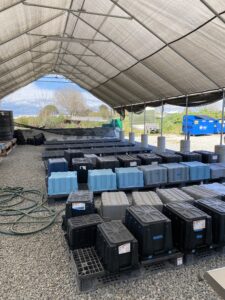
Production Team:
- Podcast hosted by Grace Perry
- Audio engineering and editing by Jaime Roque
Release Date 5/18/22
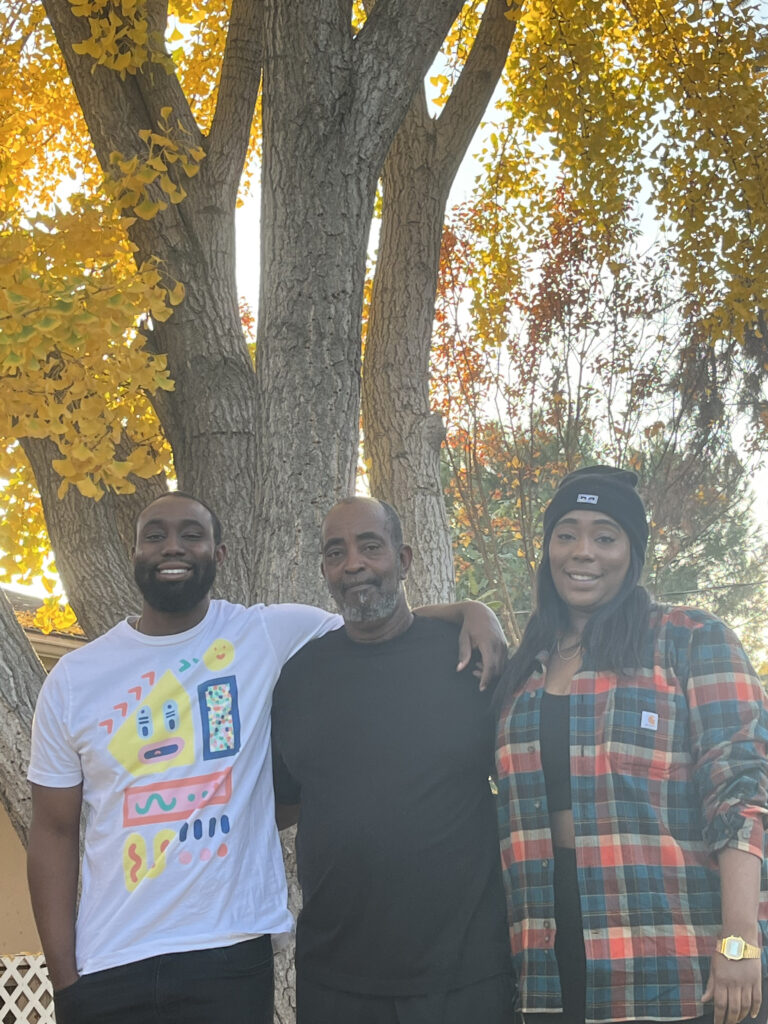
Photo from Donald Sherman
In this episode we visit Donald Sherman at his farm in Kerman, California. Donald owns and operates Sherman Produce, a year-round diversified vegetable farm and produce market distributing throughout Fresno County. Donald has been involved in agriculture his entire life and knows about managing on-farm food safety risks. We talk to Donald about his family business and involvement with the African American Farmers of California. Then, we dig into food safety topics like maintaining food safety across multiple farm locations and reducing risks during post-harvest processing.
SHOW NOTES:
- Learn more about the African American Farmers of California: https://aafcalifornia.org/
- A guide to safely dispensing sanitizers from the University of Vermont: https://blog.uvm.edu/cwcallah/2020/12/15/safely-dispensing-sanitizers/
- A guide to choosing bins, buckets, baskets and totes from the University of Vermont: https://blog.uvm.edu/cwcallah/2018/11/14/bins-buckets-baskets-totes/
- Excel Tool for Selecting a Labeled Sanitizer for Product from the Produce Safety Alliance (find it under the ‘Sanitation’ heading): https://producesafetyalliance.cornell.edu/resources/general-resource-listing/
- Learn more about CAFF’s food safety work with farmers here and here
- CAFF’s Food Safety Templates: http://caff.org/food-safety/food-safety-plan-templates/
- The UCCE Small Farms Program – supporting farmers in Fresno and Tulare Counties: https://smallfarmsfresno.ucanr.edu/
Production Team:
- Podcast hosted by Grace Perry
- Audio engineering and editing by Jaime Roque
Release Date 5/25/22

Photo from Vitis and Ovis Farm
In this episode we visit Vitis and Ovis Farm, a multi-generational Swiss-American-Ethiopian family farm located in the Capay Valley and specializing in pastured duck eggs, fruit and medicinal herbs. We talk to Hans, Barbara and Giselle Herren about the 30+ years of stewarding their land, including the recent shift from producing only wine grapes to planning for a more diversified operation designed with permaculture principles. While they wait for their fruit trees to mature, the family shares how they plan to rotate ducks throughout their orchard while also maintaining food safety standards. They also describe some of the infrastructure changes they made recently to ensure their packing and storage areas are easy to clean and sanitize, and at lower risk of cross contamination.
SHOW NOTES:
- Vitis and Ovis Farm website: https://www.vitisovisfarm.com/
- Vitis and Ovis Farm Instagram: https://www.instagram.com/vitisovisfarm/
- Learn more about the Capay Valley Farm Shop: http://www.capayvalleyfarmshop.com/
- Balancing Food Safety and Organic Requirements for Soil Amendments of Animal Origin from CAFF: http://caff.org/wp-content/uploads/2018/01/Soil-Amendments.pdf
- A guide to Floor Design for Vegetable Wash, Pack and Storage Areas from the University of Vermont: https://blog.uvm.edu/cwcallah/2018/05/21/floor-design-for-vegetable-wash-pack-and-storage-areas/
- Read True Cost Accounting for Food at no cost (Open Access copy): https://www.taylorfrancis.com/books/oa-edit/10.4324/9781003050803/true-cost-accounting-food-barbara-gemmill-herren-lauren-baker-paula-daniels
- CAFF’s Food Safety Templates (including SOPs and Preharvest checklists): http://caff.org/food-safety/food-safety-plan-templates/
- Learn more about CAFF’s food safety work with farmers here and here
Production Team:
- Podcast hosted by Grace Perry
- Audio engineering and editing by Jaime Roque
Release Date 6/1/22
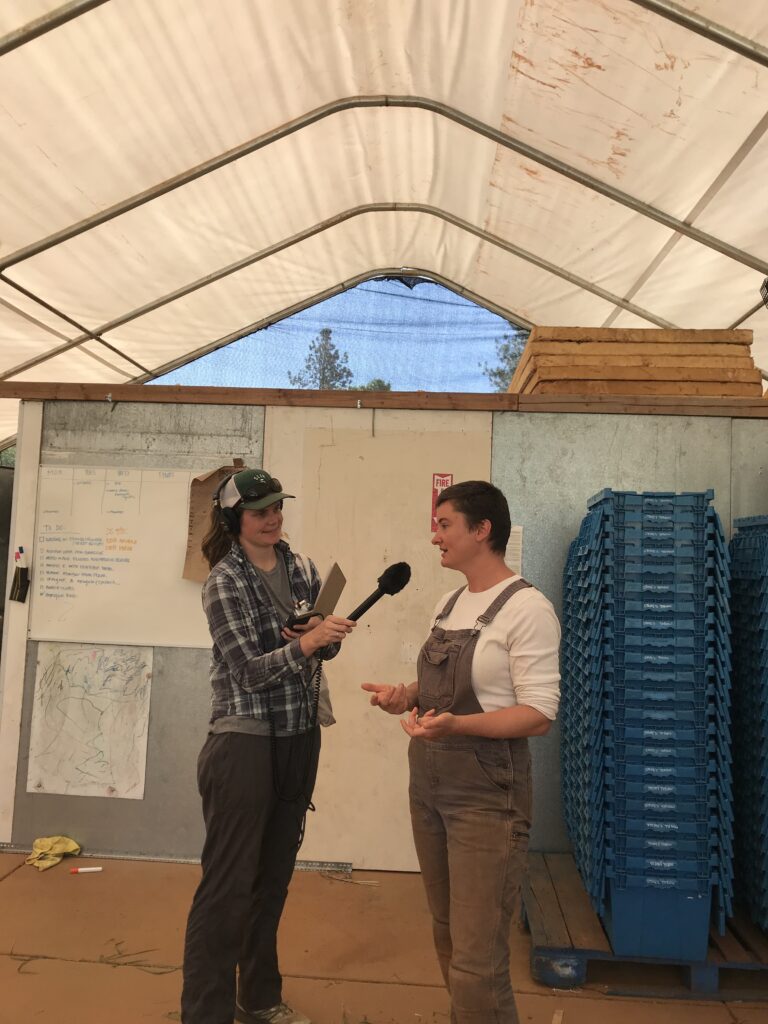
Photo from Stone’s Throw Farm
In this episode we visit Stone’s Throw Farm, an organic vegetable and flower farm located in Colfax, California. We sat down with Bryanna Eisenhut, co-owner and operator of Stone’s Throw, to learn about her path to farming full-time and what it’s like to farm in the foothills of the Sierra’s. Bryanna also shares about the challenges and opportunities her family experienced while navigating the coronavirus pandemic and farming with young kids. Lastly, we hear how a winter storm ruined the farm’s original packhouse and how they recovered. Bryanna tells us about her favorite packhouse equipment and changes they made to improve food safety in their post-harvest operations.
SHOW NOTES:
- Stone’s Throw Farm website: https://www.stonesthrowfarmca.com/
- Stone’s Throw Farm Instagram: https://www.instagram.com/stonesthrowfarmca/
- Instructions for building a low-cost handwashing station for food safety on the farm from the University of Minnesota Extension: https://extension.umn.edu/growing-safe-food/handwashing-station
- Watch the Right Sized Sanitation Practices and Post-harvest Tool for Small Farms Video featuring Bryanna Eisenhut’s favorite post-harvest equipment mentioned in this episode: http://caff.org/right-sized-sanitation-practices-and-post-harvest-tools-for-small-farms-video/
- A list of the resources mentioned in the video: https://caff.org/wp-content/uploads/2022/02/post-harvest-tools-for-small-farms-video-resources-3.pdf
- CAFF’s Food Safety Templates: http://caff.org/food-safety/food-safety-plan-templates/
- Learn more about CAFF’s food safety work with farmers here and here
Photos from the updated packhouse:
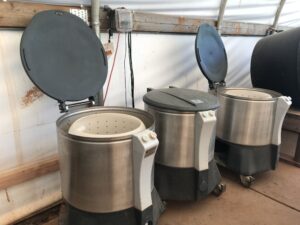
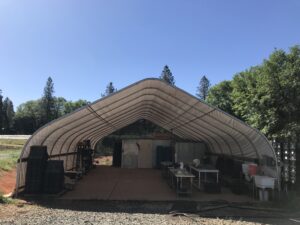
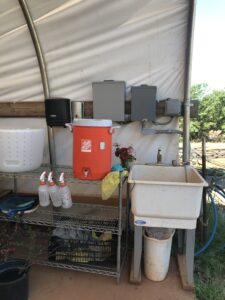
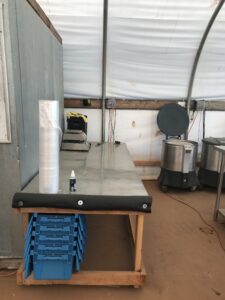
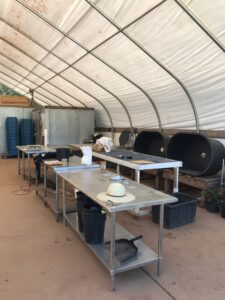
Production Team:
- Podcast hosted by Grace Perry
- Audio engineering and editing by Jaime Roque
Release Date 6/15/22
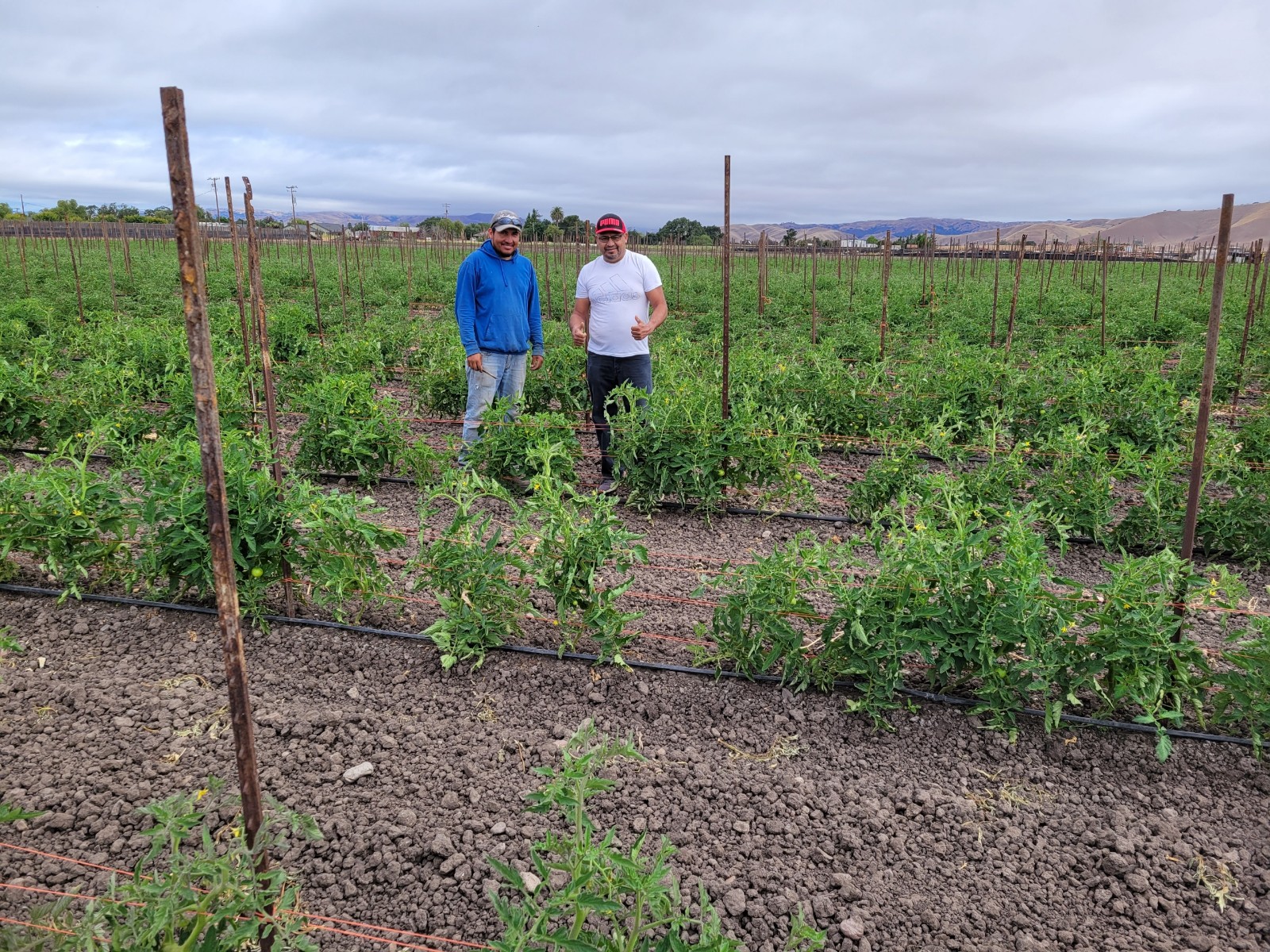
Photo from Luna’s Farm
Queridas oyentes, este es nuestro último episodio de la temporada. Esperamos que disfrute de este episodio especial en español presentado por el productor de nuestro podcast, Jaime Roque.
En este episodio, visitamos Luna’s Farm, una granja familiar Latinx multigeneracional que cultiva vegetales orgánicos en Hollister, California. Antonio Luna comparte sobre la granja de su familia y su historia agrícola en los Estados Unidos, que se remonta a más de tres décadas. Aprendemos cómo la granja reduce los riesgos de inocuidad alimentaria a través del uso del agua, la capacitación de los empleados y la evaluación previa a la cosecha para detectar la intrusión de animales. Antonio también comparte consejos para otros agricultores sobre el mantenimiento de registros de inocuidad alimentaria.
NOTAS DEL PROGRAMA:
- Más sobre Luna’s Farm: https://veritablevegetable.com/grower/lunas-farm/
- Plantillas de inocuidad alimentaria de CAFF en español (incluida la capacitación de empleados, evaluaciones previas a la cosecha y plantillas de mantenimiento de registros): http://caff.org/food-safety-templates-spanish/
- Guía de productos orgánicos e inocuidad alimentaria: http://caff.org/organics-and-food-safety/
- Más sobre prácticas agrícolas que son benéficas para el medio ambiente: http://caff.org/ecologicalfarming/
- ¿Tiene más preguntas sobre la inocuidad alimentaria en su granja? Póngase en contacto con el personal de inocuidad alimentaria de CAFF enviando un correo electrónico a Grace a grace@caff.org
Production Team:
- Podcast hosted by Grace Perry
- Audio engineering and editing by Jaime Roque
Release Date 6/22/22
The second season of the Farmers Beet is funded by the California Speciality Crop Small and Medium Scale Farm Food Safety Technical Assistance Program, made possible by the United States Department of Agriculture.
SEASON 1
Photo from Live Oak Farm
Show notes:
- FDA FSMA pdf of law: https://www.fda.gov/food/guidanceregulation/fsma/ucm334114.htm
- Live Oak Farm’s Facebook page: https://www.facebook.com/liveoakfarmpetaluma/
- Instagram: @liveoakfarmpetaluma https://www.instagram.com/liveoakfarmpetaluma/
- Compost thermometer: https://reotemp.com/compost/heavy-duty-compost-thermometer/
- Compost turner – Sittler machine: http://www.globalrepair.ca/compost%20testimonies.htm
- Find PSA’s free sanitizer excel tool “PSA Labeled Sanitizers For Produce” on this webpage: https://producesafetyalliance.cornell.edu/resources/general-resource-listing/
- FSMA 101 Webinar: https://www.youtube.com/watch?v=AWKf-yKMlkA
Photo from Full Belly Farm
Show notes:
- Full Belly Farm website: http://fullbellyfarm.com/
- Full Belly Farm instagram: @full_belly_farm https://www.instagram.com/full_belly_farm/
- FDA FSMA pdf of law: https://www.fda.gov/food/guidanceregulation/fsma/ucm334114.htm
- Hotsy Hot Water Pressure Washer: http://www.hotsy.com/Hot_Water_Pressure_Washers
- See page 133 of Martin’s Produce Supply’s online catalogue and call them to discuss further: https://www.martinsproducesupplies.com/sites/default/files/Catalog-2018.pdf
- CAFF Food Safety Training Templates and many others: http://caff.org/food-safety/food-safety-plan-templates/
- CAFF’s 2018 Hedgerow Manual: http://caff.org/hedgerows-farmscaping-for-california-agriculture-guide/
- Wild Farm Alliance: https://www.wildfarmalliance.org/biodiversity
Photo from Foothill Roots Farm
Show notes:
- Foothill Roots Farm website: https://foothillrootsfarm.com/
- Foothill Roots Farm instagram: @foothillrootsfarm https://www.instagram.com/foothillrootsfarm/
- FDA FSMA pdf of law: https://www.fda.gov/food/guidanceregulation/fsma/ucm334114.htm
- University of Vermont Extension Greens Spinner resource: http://blog.uvm.edu/cwcallah/2018/07/20/greens-spinners-for-farm-use/
- Search for Joy Fish Baskets or H&H baskets to find plastic baskets for spinning greens. Make sure to find a size that works for your dryer. Here’s a link to baskets available at Joy Fish: https://joyfish.co/products/fish-baskets
- Photos of their dryer:
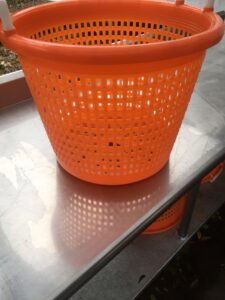
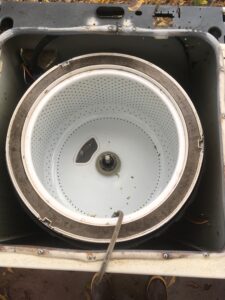
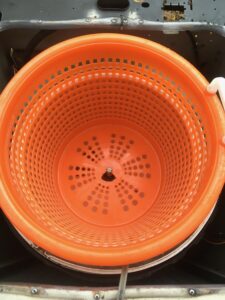
Release date: 3/13/19
Photo from Red Shed Farm
Show notes:
-
Red Shed Farm website: http://www.redshedfarming.com/
-
Red Shed Farm instagram: @redshedfarm https://www.instagram.com/redshedfarm/
-
FDA FSMA pdf of law: https://www.fda.gov/food/guidanceregulation/fsma/ucm334114.htm
-
SARE “Farmer’s Guide to Business Structures” – book is a great resource for farmers to read when starting a business and determining business structure, there’s also a chapter specifically on value added farm business entities: https://www.sare.org/Newsroom/Press-Releases/New-Improve-Resilience-and-Stability-With-Farmers-Guide-to-Business-Structures
-
CAFF’s and UC Extension’s Value Added Product timelines and webinars explaining the resources can be found here: http://caff.org/value-added-products/
-
California Department of Public Health Webpages for various value added product permits:
Release date: 3/20/19

